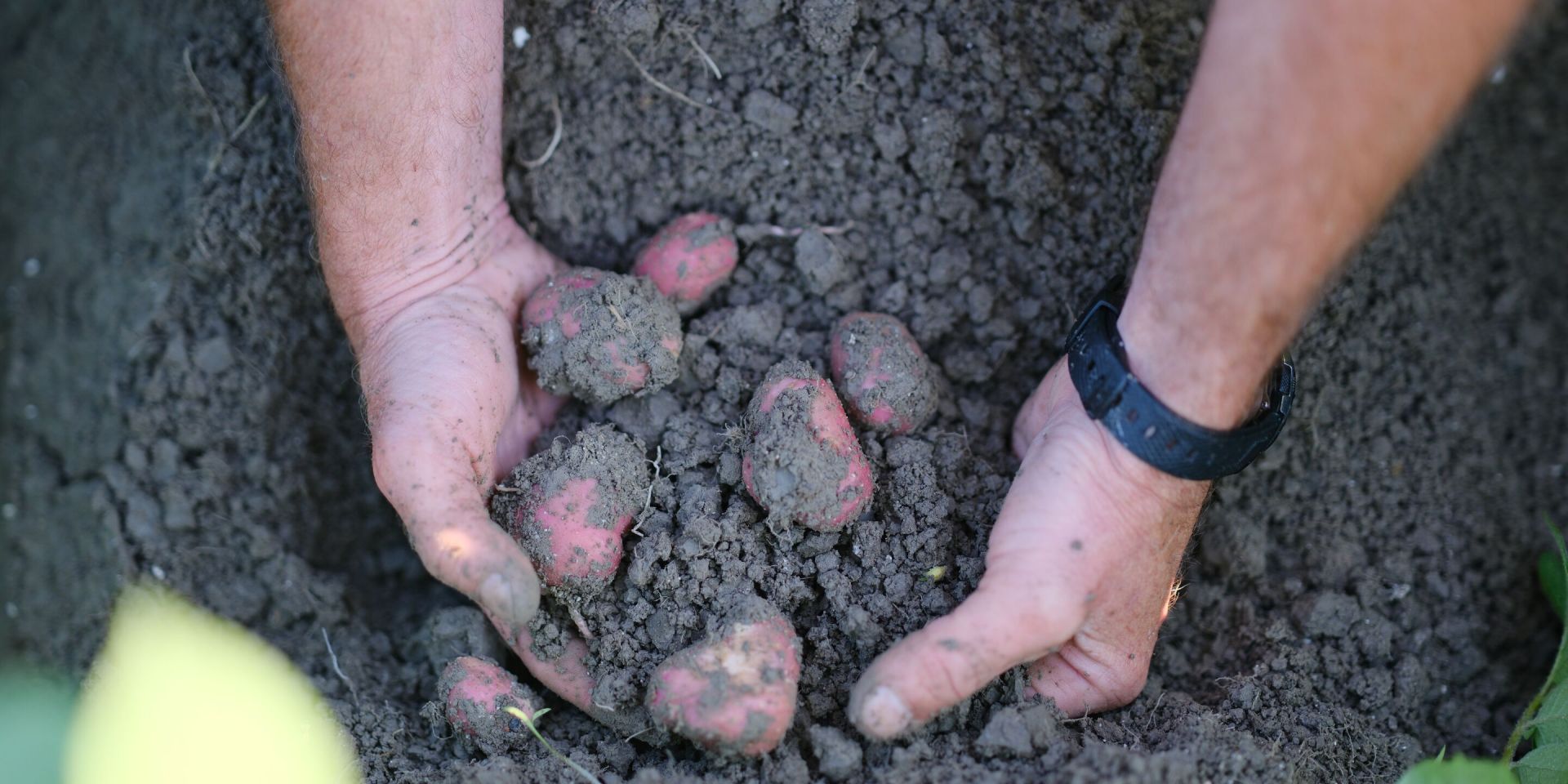
The importance of healthy soil
How healthy soil contributes to the environment, food security and social impact
Our growers know it better than anyone: a healthy soil is crucial for good potato growing. But a healthy soil offers more. It contributes to all the main pillars of HZPC in the field of sustainability. The talk we had with grower Pieter Klaas Westerhuis from Usquert in Groningen confirms this: "We don't want to leave any problems behind for the next generation to solve".
The family business of Pieter Klaas Westerhuis has existed for over 200 years. He is 6th generation in the farm and has been growing seed potatoes since 1993 on one of the largest Wadden areas in the Netherlands. The knowledge and passion for arable farming has been passed on again and again and the next generation is now ready. His son Pieter joined the family business last year. Both are convinced of the importance of a healthy soil. And Pieter Klaas loves to share his knowledge, experience and vision of seed potato growing and sustainability.

Knowledge of soil
In 1996, Pieter Klaas decided to take a course on soil and fertiliser. He gained insights that are still useful today. Pieter Klaas: "One of the first things I learned was to use deep-rooted crops, such as wheat. This prevents soil compaction. The decision to grow wheat after a harvest is part of a crop rotation plan. This type of plan is used by growers to keep the soil quality high. Besides the use of deep-rooted crops, fertilisation is also a very important factor. Pieter Klaas mainly uses animal fertiliser, which is better for the soil than artificial fertiliser.
Fertilisation
Pieter Klaas: "One of the advantages of animal fertiliser is that it not only contains nitrogen, but also many other minerals. With the right animal fertiliser, you create good soil life full of worms, mould and good bacteria. We use different kinds of animal fertilisers. including chicken fertiliser, rich horse fertiliser and slurry (the wet part of cow fertiliser). We inject this slurry into soil when the wheat is already growing, when the crop has reached a height of around 10 cm. By injecting into a growing crop, you create very few emissions and wheat plants can cope with to this kind of fertilisation. Under the right conditions, the effect is lost after just a few days.
Together with an advisor from Delphy, Pieter Klaas investigates the quality of the soil. They look at the presence of organic matter, chalk and the pH level, among other things. Based on this research, they draw up a fertilisation plan. This allows them to ensure that the soil is capable of supplying the right nutrients.
“The combination of these varieties with the healthy soil in which we grow them, ensures a good resistance level; the potatoes are less sensitive to viruses, bacteria and Phytophthora. Also, the yield is high."

Knowledge of potatoes
Pieter Klaas: "The soil here is made of clay; it is full of clay particles.That's logical because this land is and always will be a polder. Many years of experience have given us a deep understanding of 'our' soil. This knowledge also means knowing which potato varieties are ideal for the soil.” Together with Garco van der Berg, field employee at HZPC, Pieter Klaas discusses which varieties to grow. Pieter Klaas: "It is important that we do this together. Garco has the knowledge from the network at HZPC and knows very well what the market demands." Besides Vivaldi and Innovator, they have been growing the varieties Memphis and La Vie for the past few years. “The combination of these varieties with the healthy soil in which we grow them, ensures a good resistance level; the potatoes are less sensitive to viruses, bacteria and Phytophthora. Also, the yield is high."
What is healthy soil?
"A healthy soil is able to live. There is room for worms and lots of organic matter. A living soil can store a great deal of water and retain enough moisture for dry periods. These are all important properties, with a view to the future," says Pieter Klaas.
In recent years, they have used soil improvement and are doing everything they can to optimise the condition of the soil. They have installed drainage, levelled parts of the ground and are always trying to improve in terms of access. their overall goal is to make the best possible use of the soil and to spare the land as much as possible.

Non-inversion tillage
The future has already begun. On Pieter Klaas' farm, for example, they have been using non-inversion tillage for years. They work the soil without ploughing (too deeply) because ploughing breaks down organic matter. "Our son Pieter is also very enthusiastic about it. In the coming years we want to scale up the amount of land we cultivate this way". But it is a method that requires investments. You need different machines of machine components, for example different tractor tyres.
Thanks to non-inversion tillage, the soil has a chance to develop. Soil life is no longer harshly disrupted. Pieter Klaas: "We can see that the moisture balance is much better in the soil that we no longer plough."
It is important to improve the moisture balance of the soil because in the future, wet periods may become wetter and dry periods drier. Pieter Klaas adds: "The soil that we improve with non-inversion tillage has a much better sponge effect. It retains moisture when it needs to and drains it away when it can. The soil develops a greater load-bearing capacity." And soil with a greater load-bearing capacity contributes to better harvest security and therefore food security.
Vision of sustainability HZPC
We are and will always be faced with changing circumstances. This has consequences for the environment, food security and social impact. These are the three pillars of HZPC in the field of Corporate Social Responsibility (CSR), our vision on sustainability. It is the firm belief of HZPC that our seed potatoes can really make a difference in the world; with seed potatoes from our growers, growers worldwide can produce healthy food locally. That is why we invest in innovation and in collaboration with the soil experts: our growers. Innovation and cooperation lead to new products and services with which we stimulate the development of responsible food for the world population.
Pieter Klaas: "In our family business, as well as looking at the next harvest, we always look to the long term. We look for the right balance between an economically good result and continuity. We take good care of our buildings and machinery, take good care of ourselves and take good care of the place where our sustainable food grows: the soil. We leave no problems behind for the next generation to solve. In this way, we not only realise an income for ourselves, we also ensure that the next generation of growers can earn a good living too; it's a social return. A healthy future starts in the ground."
“We not only realise an income for ourselves, we also ensure that the next generation of growers can earn a good living too; it's a social return. A healthy future starts in the ground"
This article contributes to the following sustainable development goals:
Sustainability report
Want to know more about our vision of sustainability and the steps we are taking? Read all about it in our sustainability report.
Even Greener. The future starts in de ground
As our growers invest in their soil, HZPC also invests in the future. For instance with Even Greener. A selection of sustainable potato varieties with a lower impact on the environment.





